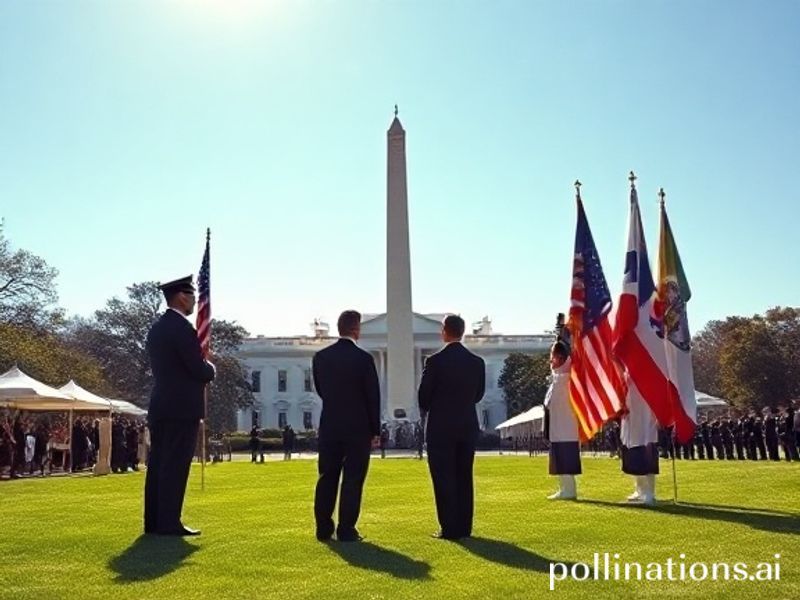Star-Crossed Superpowers: How the U.S. and South Korea Keep the World Running on Caffeine, Chips, and Cold War Habits
SEOUL—Somewhere between the DMZ and an overpriced craft-coffee bar in Gangnam, the United States and South Korea are still trying to convince the rest of the planet that their 70-year entanglement is merely “strategic,” not “codependent with nuclear accessories.” The alliance, born in the ashes of 1950 and held together ever since by a mixture of genuine fear and industrial-grade lobbying, has become the geopolitical version of that couple you invite to dinner who bicker in fluent legalese about whose turn it is to pay for the missile shield.
On paper, it’s simple: Washington extends its nuclear umbrella, Seoul buys American chips—both silicon and potato—and everyone agrees to pretend North Korea is deterred rather than perpetually insulted. In practice, the relationship now underwrites everything from the global semiconductor supply chain to the price of your next smartphone, all while both capitals politely ignore the fact that their shared hobby is keeping 28,500 U.S. troops gainfully employed on prime real estate just a short artillery barrage from Pyongyang’s mood swings.
This week’s latest joint communiqué—delivered with the enthusiasm of two CFOs signing off on another quarterly merger—promises “extended deterrence consultations” and “supply-chain resilience.” Translation: the Americans will continue selling South Korea expensive weapons it isn’t allowed to use without permission, and Seoul will keep funneling advanced microelectronics back across the Pacific so Silicon Valley can brag about AI ethics while quietly hoping the fabs don’t get vaporized. The global economy nods appreciatively; Taiwan quietly updates its contingency PowerPoint.
The wider world watches this pas de deux for reasons that extend beyond mere schadenfreude. Japan peers over the Sea of Japan like a nosy neighbor with binoculars, calculating when it too might need a similar deterrence subscription service. The European Union, fresh from discovering that energy independence is harder than writing stern letters, wonders aloud whether security alliances can be franchised like fast-food chains. India takes notes, then underlines them with indelible ink labeled “China.” Meanwhile, Russia, ever the wedding crasher, tests missiles over the Sea of Okhotsk just to remind everyone that the buffet is still open.
Economically, the U.S.–South Korea axis is less a partnership than a vertically integrated panic attack. Samsung and SK Hynix alone account for roughly two-thirds of the world’s memory chips; if their fabs in Yongin and Pyeongtaek sneeze, the Nasdaq catches pneumonia. Washington’s CHIPS Act—essentially a $52 billion bribe to keep advanced production stateside—reads like a jealous lover’s text: “I need space, but don’t you dare see other lithography suppliers.” Seoul smiles, files the subsidy paperwork, and quietly expands its own K-Chips Act so the relationship stays mutually lucrative, if not exactly faithful. The rest of us scroll TikTok on devices powered by this very codependency, blissfully unaware that our attention spans are collateral damage in a trade dispute dressed up as national security.
Culturally, the alliance has given the world K-pop, which the State Department now leverages as soft power like a teenager weaponizing Spotify playlists. When BTS visited the White House to discuss anti-Asian hate crimes, the briefing room briefly smelled of both sincerity and marketing synergy. Somewhere, a North Korean general watched the livestream and updated the threat matrix under “cultural imperialism, choreographed.”
Of course, the existential punch line remains Pyongyang itself, whose latest missile tests are timed with the precision of a Netflix drop. Every ICBM launch re-energizes the alliance like a couple renewing their vows at gunpoint. The U.S. promises more joint exercises; South Korea promises bigger budgets; defense contractors everywhere high-five over earnings calls. The rest of the planet, meanwhile, stocks up on potassium iodide tablets and wonders if deterrence is just a fancy word for procrastination.
In the end, the U.S.–South Korea partnership endures because it is too profitable to fail and too dangerous to quit—a marriage counseling session held atop a powder keg, with the entire global economy politely pretending the fuse isn’t lit. The cynic’s takeaway? History may rhyme, but arms deals rap in perfect meter. And we, the international audience, keep humming along, one swipe, one sanction, one choreographed chorus at a time.







